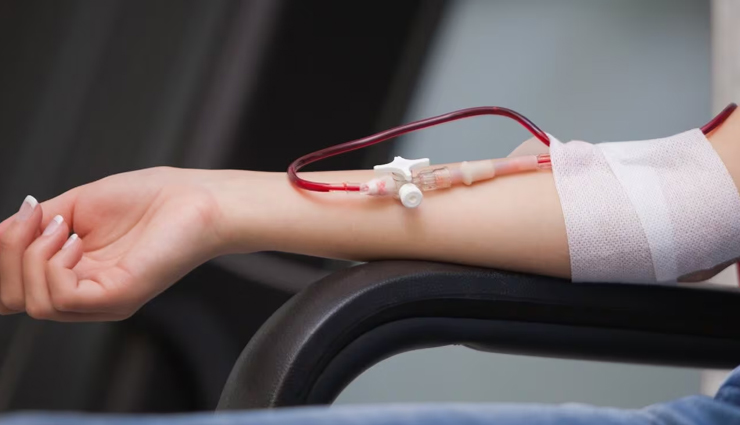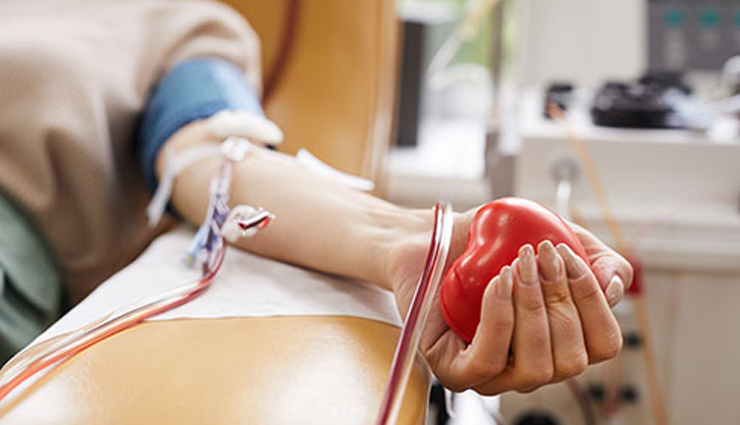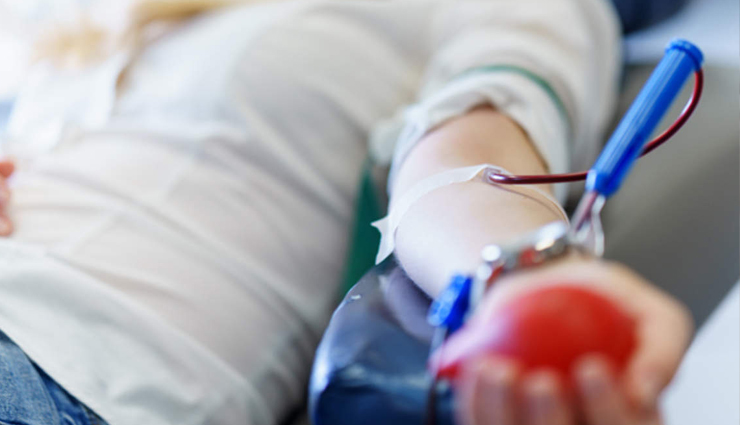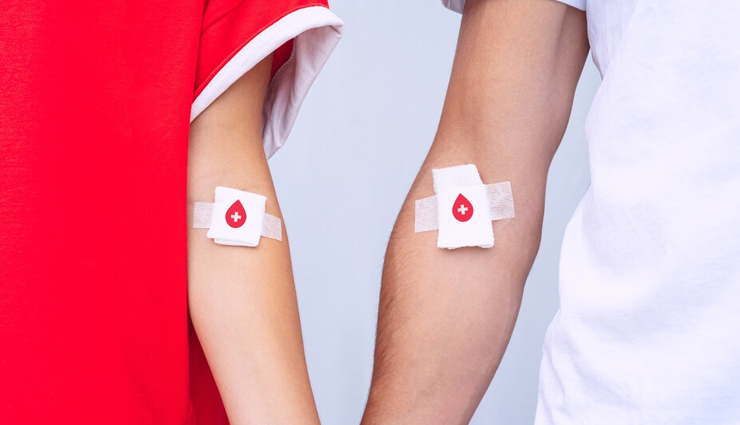- Home›
- Healthy Living›
- World Blood Donor Day : 20 Do's And Don't To Follow Before And After Blood Donation
World Blood Donor Day : 20 Do's And Don't To Follow Before And After Blood Donation
By: Priyanka Maheshwari Tue, 13 June 2023 11:37:54

Did you know that the 14th of June is designated as World Blood Donor Day? The theme for this year is "safe blood save lives," accompanied by the slogan "Give blood and contribute to a healthier world."
It's remarkable to note that a single unit of donated blood has the potential to save up to three lives. This is achievable because the donated blood is divided into its essential components, namely red blood cells, plasma, and platelets. The demand for blood is constant, as it is vital for individuals dealing with blood disorders like thalassemia and hemophilia, as well as for the treatment of injuries resulting from accidents, major surgeries, anemia, and other conditions.
If you're curious about your eligibility to donate blood, here's what you should be aware of before making plans for blood donation.

Why Should You Donate Blood?
In addition to saving lives, blood donation offers various significant benefits that are often overlooked. It helps maintain the body's iron levels, regulates blood flow, lowers the risk of cardiovascular disease and stroke, stimulates the production of new blood cells, and even aids in weight loss. Furthermore, donating blood has a positive impact on both the physical and psychological well-being of the donor.
If you're considering donating blood, the first step is to get yourself registered. You can donate blood at a licensed blood bank, blood donation camps, or mobile blood donation units. Although the actual blood donation process typically takes around 15 minutes, the entire procedure, including registration, medical check-up, donation, and post-donation rest, usually doesn't exceed 30 minutes.
Are YOU Eligible For Blood Donation?
Blood donation is open to any healthy adult, regardless of gender. A healthy individual can safely donate 350 ml of blood, which is equivalent to one unit. Men can donate blood safely every three months, while women can donate every four months. However, there are specific criteria that must be met in order to be eligible as a donor. These criteria include:
Weight: The donor must not weigh less than 45 kgs.
Pulse: The donor's pulse rate should fall within the normal range of 60 to 100 beats per minute.
Body temperature: The donor's body temperature should be normal, around 98.6°F (37°C).
Hemoglobin: The hemoglobin level should not be less than 12.5 grams per deciliter.
Blood pressure: Both systolic and diastolic blood pressure should be within the normal range of 120/80 mm Hg.
Age: Donors should be in the age group of 18 to 65 years.
Do’s And Don’ts To Follow Before And After Blood Donation
Here are some tips to follow before donating blood:

- Ensure you meet the eligibility criteria: Check if you meet the requirements to donate blood, such as age, weight, and overall health. Review the specific criteria set by the blood donation center or organization.
- Stay hydrated: Drink plenty of fluids in the days leading up to your donation. Being well-hydrated helps ensure an easier blood draw and reduces the chances of feeling lightheaded or dizzy.
- Eat a nutritious meal: Have a balanced meal before donating blood. Include foods rich in iron, such as leafy greens, lean meats, and fortified cereals, to maintain healthy hemoglobin levels.
- Get a good night's sleep: Aim for a full night's rest before your donation appointment. Being well-rested contributes to your overall well-being and can make the process more comfortable.
- Avoid fatty and greasy foods: Refrain from consuming fatty or greasy foods a few hours before donating blood. These foods can affect the quality of your blood sample and may lead to complications during the donation process.
- Wear comfortable clothing: Choose loose-fitting and comfortable clothing that allows easy access to your arm for the blood draw. This will make the process more convenient and less restrictive.
- Bring identification and necessary documents: Make sure to bring a valid identification document, such as a driver's license or passport, as well as any required forms or documents requested by the blood donation center.
- Communicate any health changes: Inform the medical staff if you have experienced any recent health changes, such as illnesses, travel to specific regions, or medication adjustments. They will determine if these factors affect your eligibility to donate blood.
- Avoid alcohol and smoking: Refrain from consuming alcohol and smoking cigarettes for at least 24 hours before your blood donation. These substances can affect the quality of your blood and may lead to temporary deferral.
- Follow any additional instructions: If the blood donation center provides specific instructions or recommendations, make sure to follow them carefully. These instructions may include fasting requirements or restrictions on certain medications.
Remember, it's always advisable to consult with healthcare professionals or the blood donation center directly for personalized guidance and instructions before donating blood.

AFTER BLOOD DONATION
After donating blood, it's important to take care of yourself and allow your body to recover. Here are some tips to follow after blood donation:
- Rest and relax: Take some time to rest after your donation. Sit or lie down for a short while, especially if you feel lightheaded or dizzy. This will give your body a chance to recover and adjust.
- Stay hydrated: Drink plenty of fluids, particularly water, after donating blood. This helps replenish the fluids lost during the donation process and maintains your overall hydration.
- Avoid strenuous activities: Refrain from engaging in intense physical activities or heavy lifting for at least a few hours after donating blood. This allows your body to regain its strength and prevents potential discomfort or injury.
- Eat a nutritious snack: Have a light, healthy snack provided by the blood donation center, such as juice, crackers, or fruit. This can help stabilize your blood sugar levels and provide additional nutrients.
- Monitor the donation site: Keep an eye on the donation site for any bleeding or unusual reactions. Apply pressure and raise your arm if there is prolonged bleeding. If you notice any concerns, inform the medical staff or contact the blood donation center for guidance.
- Avoid smoking and alcohol: Refrain from smoking and consuming alcohol for a few hours after donating blood. These substances can cause dehydration and may interfere with the recovery process.
- Follow post-donation guidelines: Follow any specific instructions given by the blood donation center. This may include avoiding certain activities, medications, or dietary restrictions for a certain period of time.
- Take care of your arm: Be gentle with the arm that was used for donation. Avoid heavy lifting or putting excessive pressure on the area to prevent bruising or discomfort.
- Spread awareness: Share your blood donation experience with others to raise awareness about the importance of donating blood and encourage more people to participate.
- Feel good about your contribution: Remember that your blood donation has the potential to save lives. Take pride in your selfless act and know that you have made a positive impact on someone's health and well-being.
If you experience any unusual or persistent symptoms after donating blood, such as excessive bleeding, lightheadedness, or severe pain, seek medical attention immediately.





